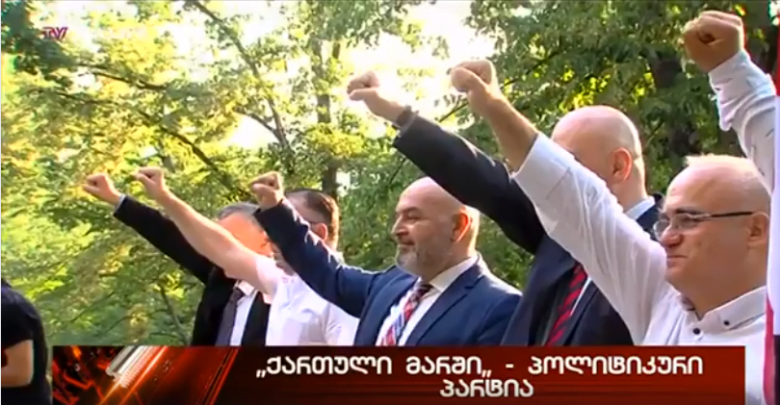
Facebook Removes Nativist Georgian March Linked Network
Social media platform Facebook announced on April 6 that it removed 23 Facebook accounts, 24 Pages, 12 Groups, and 11 Instagram accounts connected to the ultranationalist Georgian March party and its youth wing, for coordinated inauthentic behavior. It said the network targeted Georgia’s domestic audiences.
Facebook also said they found the network after reviewing public reporting on this activity by researchers at the Digital Forensic Research Lab (DFRLab) at the Atlantic Council.
DFRLab also released a new study today, according to which around 119,000 accounts followed one or more of the 24 removed pages. It also noted that removed 12 Facebook groups had a combined membership of around 10,500 accounts, with engagement with their posts being low or in many cases, close to zero.
DFRLab’s study further noted that nine of the 23 removed Facebook accounts had stolen profile pictures from elsewhere on the internet and “were likely inauthentic.” It added that some of the removed accounts that promoted Georgian March, at the same time shared content from PosTV, a pro-government media outlet.
The Georgian March Background
The Georgian March movement, uniting various ultranationalist groups, was established in 2017. In July 2017, around 2000 protesters held the “March of the Georgians” in Downtown Tbilisi, demanding the deportation of illegal immigrants, toughening the immigration law, imposing restrictions on granting residence permits to foreigners and banning foreign funding to civil society organizations.
The nativist outfit became a political party in July, prior to October 31, 2020, parliamentary elections. The party garnered 4,753 votes, amounting to 0.25% of valid votes cast.
Sandro Bregadze, the party chairperson and founder, earlier served as Deputy Minister for Diaspora Issues under the Georgian Dream administration in 2014-2016. Prior to that, Bregadze served as Deputy Minister of Internally Displaced Persons from the Occupied Territories.
The Georgian March also appeared in the report released by the Estonian Foreign Intelligence Service (EFIS) in February. According to the document, several leaders of the Georgian March had ties to Russia and amplify the Kremlin’s “influence activities.”
Also Read:
- May 2020: Facebook Removes Hundreds of Inauthentic Pages, Accounts in Georgia
- December 2019: Facebook Removes Hundreds of Govt Linked Pages for ‘Coordinated Inauthentic Behavior
This post is also available in: ქართული Русский